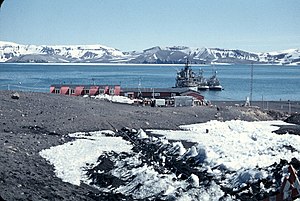Port Foster: Difference between revisions
Created page with "{{territory|British Antarctic Territory}} thumb|300px|Location of Deception Island in the South Shetland Islands '''Port Foster''',..." |
No edit summary |
||
| Line 1: | Line 1: | ||
{{territory|British Antarctic Territory}} | {{territory|British Antarctic Territory}} | ||
[[File:Deception | [[File:Deception Island Map.svg|thumb|300px|Map of Deception Island and Port Foster]] | ||
'''Port Foster''', one of the safest harbours in the Antarctic, is a natural sheltered harbour in the form of a great scoop | '''Port Foster''', one of the safest harbours in the Antarctic, is a natural sheltered harbour in the form of a great scoop out o the heart of [[Deception Island]] in the [[South Shetland Islands]], part of the [[British Antarctic Territory]]. It is formed of a drowned and breached volcanic crater, of the volcano which created the island. | ||
==History== | ==History== | ||
| Line 11: | Line 11: | ||
The harbour was charted by an Royal Navy Hydrographic Survey Unit in 1948-49. | The harbour was charted by an Royal Navy Hydrographic Survey Unit in 1948-49. | ||
[[File:Deception-Tourists.jpg|right|thumb|230px|Volcanically warmed bath at Port Foster]] | |||
==Description== | ==Description== | ||
The centre of Deception Island is a caldera, formed by a gigantic volcanic eruption and later flooded. This has created the basin-like harbour of Port Foster, six miles by four and a half miles in size. The entrance to Port Foster is only 610 yards wide and is named '[[Neptune's Bellows]]'. | The centre of Deception Island is a caldera, formed by a gigantic volcanic eruption and later flooded. This has created the basin-like harbour of Port Foster, six miles by four and a half miles in size. The entrance to Port Foster is only 610 yards wide and is named '[[Neptune's Bellows]]'. | ||
Revision as of 11:29, 24 March 2018
Port Foster, one of the safest harbours in the Antarctic, is a natural sheltered harbour in the form of a great scoop out o the heart of Deception Island in the South Shetland Islands, part of the British Antarctic Territory. It is formed of a drowned and breached volcanic crater, of the volcano which created the island.
History

The harbour was discovered by Nathaniel Palmer on 15 November 1820 and charted by Fildes in 1821. It was initially charted as 'Deception Harbour', but soon attracted the name Port Williams, after Captain William Smith's brig, the Williams, or Yankee Harbor, because of the number of American sealers who harboured there.
A little later the harbour was named 'Port' Foster after Henry Foster, commander of the 'HMS Chanticleer, who made pendulum and magnetic observations in this harbour in 1829. The latter name has become established by usage, while the former names have remained for other features in the same archipelago — Williams Point and Yankee Harbour.
The harbour was charted by an Royal Navy Hydrographic Survey Unit in 1948-49.

Description
The centre of Deception Island is a caldera, formed by a gigantic volcanic eruption and later flooded. This has created the basin-like harbour of Port Foster, six miles by four and a half miles in size. The entrance to Port Foster is only 610 yards wide and is named 'Neptune's Bellows'.
The benthic zone of Port Foster is of great ecological interest due to the natural disturbance induced by the volcanic activity. Two areas have been collectively protected as Antarctic Specially Protected Area (ASPA) No.145.[1]
The shores of the harbour were designated SSSI No. 21 under the Antarctic Treaty.[2]
Location map
- Location map: 62°57’0"S, 60°39’-0"W
References
- ↑ "Port Foster, Deception Island, South Shetland Islands". Management Plan for Antarctic Specially Protected Area No. 145: Measure 3, Appendix 2. Antarctic Treaty Secretariat. 2005. http://www.ats.aq/documents/recatt/Att284_e.pdf. Retrieved 2013-09-29.
- ↑ SPRI, 1986, p.244-45
- Gazetteer and Map of The British Antarctic Territory: Port Foster